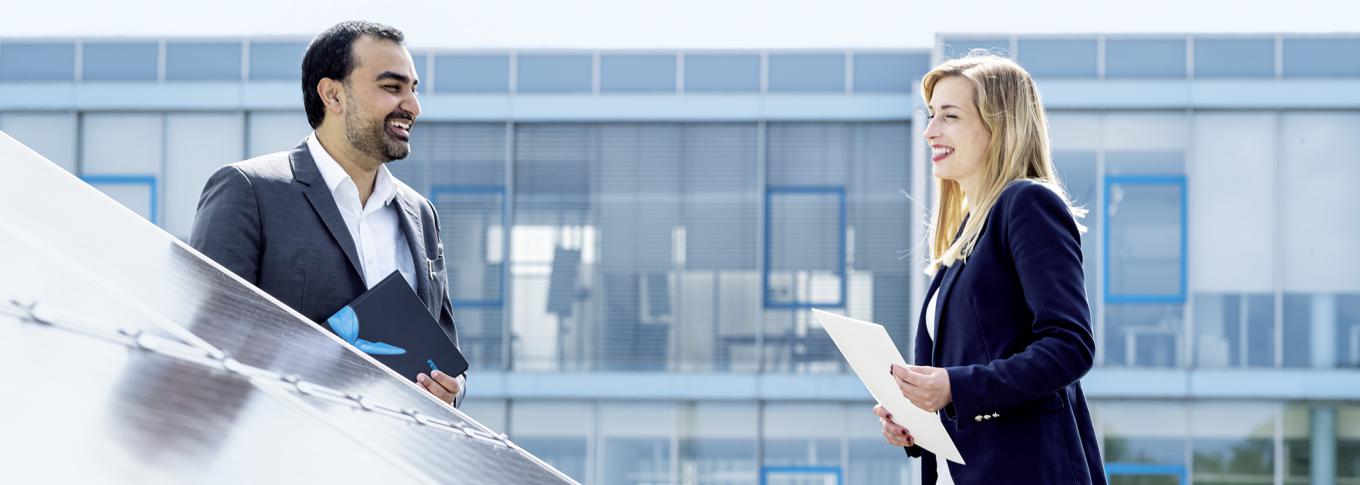
Festo continues on course for growth and innovation
The Festo Group achieved double-digit growth for another year in a row. Sales rose by 13.4% to €3.81 billion in 2022 (previous year €3.36 billion). Festo intends to continue growing in 2023. Innovative automation is the enabler for the industrial transformation towards renewable energies, sustainable production, hydrogen and circular economy.
Double-digit growth in financial year 2022
The Festo Group continued its double-digit growth in 2022. At €3.81 billion, turnover was 13.4% above the previous year (€3.36 billion). The number of employees rose slightly to around 20,800 at the end of 2022 (previous year 20,700) - of which 8,600 were employed in Germany and around 12,200 abroad.
Festo achieved double-digit growth in virtually all regions and industries. Growth was particularly strong in North and South America, China and India. Important growth impulses came from the booming electronics and semiconductor industry, the automotive and electric vehicle sectors, the biotech and lifetech sector and the process industry.
“We see further massive investments worldwide in chip factories, medical technology and laboratory automation, electromobility and sustainability. We can make a contribution everywhere through automation. A central trend is the topic of energy saving. In the current situation, our customers want to position themselves more resiliently with energy-efficient automation solutions,” said Chairman Dipl.-Ing. Dr. h.c. Oliver Jung.
High energy prices and inflation are leading to an increase in prices for consumer goods and food in Europe. “Here, too, automation is the key to counteracting the price explosion and making industries competitive and sustainable,” explained Dr. Oliver Jung.
Investments in digitalisation, IT, software and AI
Festo invested around 7% in research and development last year. The Management Board division “Information Technology and Digitalisation” drives the wide range of activities relating to digitalisation, IT, software development and AI within the company.
Artificial intelligence directly in the production process is the next step of Industry 4.0. Intelligent control and AI also form the basis for more energy efficiency and sustainability on the way to CO2-neutral production. “The importance of electronics, software and AI in our products for automation continues to grow. We are therefore expanding our expertise in this area globally and also locally in our Technical Engineering Centres in the growth markets,” explained Dr. Oliver Jung.
This also includes the Industry-on-Campus cooperation with the University of Tübingen in the heart of Baden-Württemberg’s Cyber Valley. Festo has its own laboratory there and conducts application-oriented research into various AI methods. The initial focus is on deep reinforcement learning for robotics.
Festo also provides training in new apprenticeships and dual courses of study alongside existing ones. “This year we have the first graduates in Data Science, Infotronic and E-Commerce. They bring with them profiles and skills that we don’t get on the labour market like this,” said Dr. Oliver Jung. In 2023, apprentices and students will start at Festo for the first time in information technology, IT security as well as digitalisation management.
Sustainability drives structural change and further growth
Innovative automation is the enabler for a sustainable transformation of industry towards energy-efficient CO2-neutral production and a circular economy that is open to various technologies.
“With our Blue World approach, we support the structural change in many industries worldwide, such as the energy sector towards renewable energies or electromobility. We can bring processes such as the production of green hydrogen or batteries for electric vehicles, but also downstream recycling, into broad industrial application and make them economical through automation. In addition, we are developing automated solutions for the biological transformation as the basis for a completely new circular economy. Another enabler is the industrial workforce development with lifelong learning concepts from our Festo Didactic,” said Dr. Oliver Jung.
Sustainability is an integral part of Festo’s corporate strategy and is aligned with the Sustainable Development Goals (SDGs) of the United Nations. Ecological, economic and social aspects are considered together. For Festo, the focus is on climate protection and reducing the carbon footprint – from product development and optimised supply chains to efficient use by customers.
Since this year, all Festo buildings in Germany as well as all global production and logistics locations are CO2-neutral with regard to Scope 1 and 2. This is to be achieved for the entire Festo Group by 2026 at the latest. The greatest leverage and core of activities lies in the development of energy-efficient solutions for customers in Scope 3.
“We see great potential here for efficient resource-saving production across the entire spectrum of factory and process automation flanked by suitable qualification solutions – from the booming sectors of electronics, semiconductors and life tech to food and the agricultural sector, automotive, electric vehicles and batteries to mining, chemicals, oil, gas, renewable energies and future technologies such as green hydrogen,” said Dr. Oliver Jung, explaining the further strategic orientation.
费斯托 (Festo)是一家全球性的独立的家族企业,总部位于德国埃斯林根。自成立以来,Festo在工业自动化技术和技术教育方面制定标准,从而为环境、经济和社会的可持续发展做出贡献。公司为超过35个行业的30万家工厂和过程自动化客户提供气动和电驱动自动化技术解决方案,其中生命科学和实验室自动化业务受到越来越多的关注。Festo产品和服务遍布176个国家。2024年,费斯托在全球61个国家的250多个分支机构拥有约20600名员工,实现销售额34.5亿欧元。每年约8%的销售额用于研发。在这家学习型企业,1.5%的销售额用于基础和进一步培训。Festo 教学培训 (Didactic SE) 是全球领先的技术教育和培训供应商,为全球客户提供工业环境中全面的数字化和常规学习解决方案。

